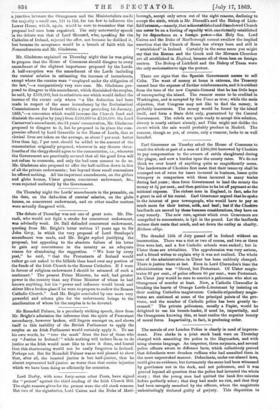Mr. Gladstone explained on Thursday night that he was going
to propose that the House of Commons should disagree to every amendment of the slightest importance proposed by the Lords. A half-exception was the amendment of the Lords including the curates' salaries in estimating the incomes of incumbents, except where the curates were "employed under the obligation of the law,"—a comparatively very rare ease. Mr. Gladstone pro- posed to disagree to this amendment, which diminished the surplus, he said, by 1.519,000, but to substitute one which would deduct the income of the curate only where "a like deduction had been made in respect of the same incumbency by the Ecclesiastical Commissioners for Ireland within a year preceding 1st January, 1869,"—a concession which would increase the Church fund and diminish the surplus by (say) from £100,000 to £150,000. On Lord Carnarvon's amendment, the 14 years' commutation, Mr. Gladstone proposed to disagree to it, but he proposed in its place the com- promise offered by Lord Granville in the House of Lords, that as clerical lives are taken on the average, as about 7 per cent. better lives than lay, 7 per cent, should be added to the amount of the commutation originally proposed, wherever in any diocese three- fourths of the clergyshould agree to the commutation, i.e., wherever the Government are practically secured that all the good lives will not refuse to commute, and only the bad ones consent to do so. Mr. Gladstone also proposed to offer the half-million down in lieu of all the private endowments ; but beyond these small concessions he offered nothing. All the important amendments, on the glebes and glebe houses, Ulster grants, concurrent endowment, &c., were rejected uniformly by the Government.






























 Previous page
Previous page